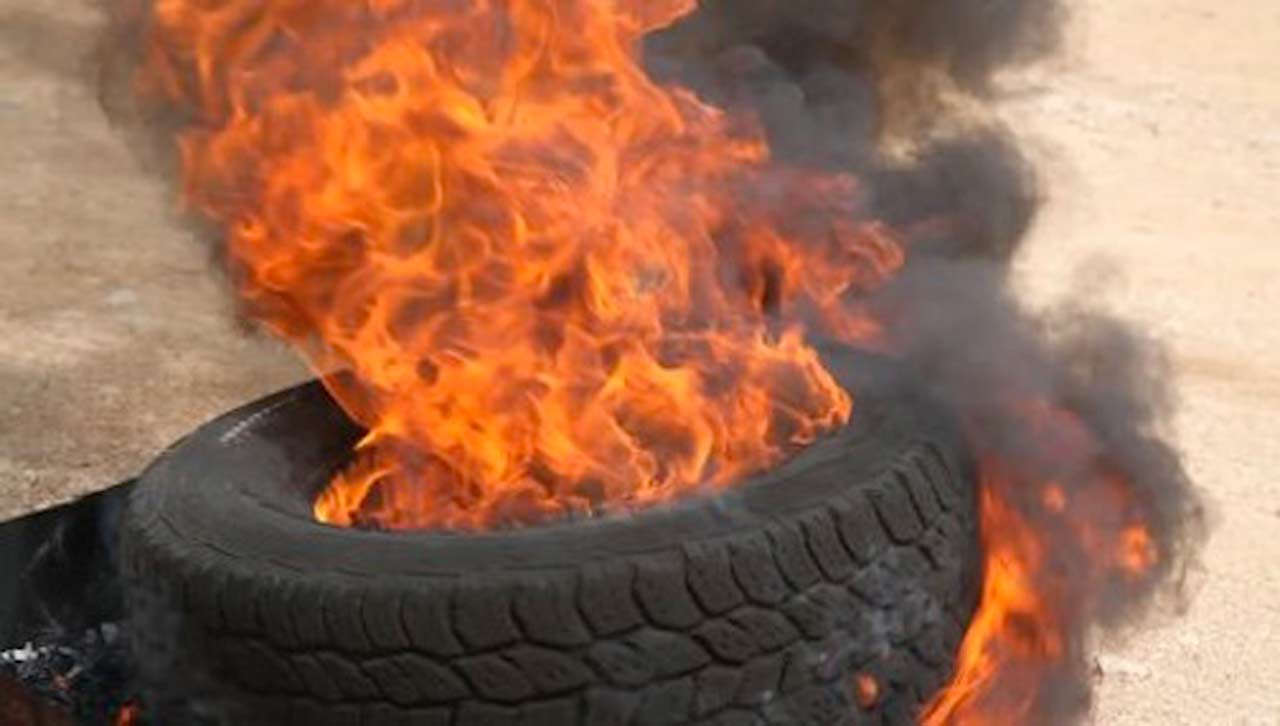
These tyres are often lit by vigilantes as a means of illumination at night without considering their impact on road infrastructure and the health of residents.
Tyres are made of rubber and when burnt, it releases thick black smoke that stays in the air for a long time this contains several toxic pollutants including carbon monoxide, which spells danger for the environment and public health.
Despite its implications, the situation is going from bad to worse as it has also become a tool for meting jungle justice to those alleged to have committed crimes in society.
In some cases, residents use it to roast animals for human consumption.
The uncontrolled exposure to burnt tyres has health effects, which could lead to irritation of the skin, eyes, respiratory effects, central nervous system and cancer.
A resident, identified simply as Mrs. Comfort Ayomide, cited Cement, Agege, Agbado, Ishaga and Oke Aro as places with uncontrolled exposure to burnt tyres.
She expressed concern that unless drastic measures are taken, Nigeria might record some deaths parallel to the coronavirus pandemic, which is taking a toll around the globe.
Ayomide, who is a health worker, stressed that indiscriminate burning of tyres could lead to irritation of skin, eyes, respiratory effects, central nervous system and cancer.
Another resident, Kunle Mayowa called for urgent action to stem the tide, stressing that indiscriminate burning of tyres in various communities at night because of thieves affects the lives of residents.
He said: “Please sample opinions and do something for them to stop it. It kills faster than viruses. It is urgent. I believe your voice will be heard faster.”
Another Lagos resident, Monday Ajayi said: “We woke up in Lagos with soot (Tyre burning remnant) in our nostrils, in our phlegm, on our hands and all over.
“This also means that we have highly polluted air to breathe. We will have to put on a face mask inside the house.”
An Ejigbo resident, Michael Okechi said: “Police, can you tell these street vigilantes to stop burning those tyres? We all would soon die from inhaling toxic smoke from frequent tyre burnings.
“The police have kept mute to this, which is bad and they know better. ”
Ayinde Omoniyi, a resident of Abule Egba, escaped death by whiskers when irate youths, who mistook him for a kidnapper nearly set him ablaze with a tyre.
He was saved by the timely arrival of a police officer, who rescued him when the mob was about to ignite the tyre. On interrogation, it was found to be a mistaken identity.
Beyond the health hazards, the former National Chairman, Nigerian Institution of Highways Transportation Engineers, Dayo Oluyemi, said it destroyed roads with asphalt pavement.
According to him, burning of tyres produce some carcinogens, which are injurious to human health and if burnt on the road with asphalt pavement, it destroys the pavement.
Also, a Senior lecturer in the Department of Mechanical Engineering, University of Lagos, Dr. Nehemiah Alozie, said burning is actually too bad and not advisable and a wrong way of disposing of the tyres.
“It is environmentally wrong and there is incomplete combustion, which is poisonous to the human body and the environment.
“Burning of tyres brings out black smoke (soot) and is dangerous to those who have health conditions like asthma, and high blood pressure, which can be aggravated.
“The effects on plants like vegetables which can be placed on the dinner table will lead to health complications. Burning of tyres on the road causes damage to the road.”
Past chairman of Apapa Branch of Nigerian Society of Engineers (NSE) Dr. Ombugadu Garba, said burning of tyres has an adverse effect on both humans and the environment as it pollutes the environment and makes it uninhabitable.
“If it’s nearby water it pollutes, thereby killing microorganisms that live in the water.
“Continual pollution of the water environment leads to animals dying and sometimes has effects when consumed on our health.
“If such tyres are burnt on the road that is made up of asphalt, it weakens that portion, which leads to the early deplorable condition of such roads or bridges,” he added.
Moju Monday, a lecturer at the Department of Sciences and Technology Education, University of Lagos believes environmental sustainability is a topical issue and the environment needs to be treated with love because whatever you give to the environment is what you get from the environment.
According to him, tyres contain many chemical substances that when released into the atmosphere cause paralytic reactions.
“These compounds accumulate in the atmosphere, which humans inhale directly and cause damaging effects such as respiratory complications, eye irritation, risk of heart failure etc.
This also reduces air quality because black soot contaminates the underground water, which destroys aquatic life. ”
MEANWHILE, the Lagos State Ministry of the Environment recently warned residents to desist from burning tyres but imbibe recycling of tyres.
The General Manager, Lagos State Environmental Protection Agency (LASEPA), Dr. Dolapo Fasawe, also urged abattoir operators to desist from burning cowhide and skin with disused tyres, saying it is carcinogenic.



